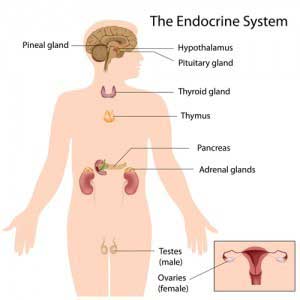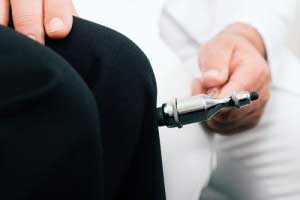“Why Am I so Tired?”: Causes of Chronic Fatigue

Part 1: Thyroid Imbalance
Our practice specializes in treating patients with Chronic Fatigue diseases. Chronic Fatigue cases are the most challenging for a physician because there are so many possible medical causes that may be involved. Chronic Fatigue is equally challenging to the patient because no obvious organ in their body is involved.
The Endocrine System & Chronic Fatigue
The Endocrine System produces hormones that are secreted in our bloodstream from specific organs (thyroid, adrenals, pancreas, testes, ovaries) that travel to other parts of the body in order to maintain metabolic (energy) function. At MMG we do a complete endocrine profile with all the key tests that may indicate why someone is experiencing fatigue.
First Stop: The Thyroid
The first place I look for trouble is with the THYROID. The thyroid produces the hormones thyroxine and L-thyronine, which are key to the body’s metabolic-energy function. If your thyroid is not functioning properly, you may feel:
- frequently cold
- very tired
- weak
You can also have very specific symptoms such as:
- constipation
- hair loss
- very dry skin
The Muscle Connection

The only clinical test that can indicate if your thyroid is off is a testing of your deep tendon reflex, with a tap on your knees or ankle. The thyroid function tests that doctors order include: T4, T3, TSH, reverse T3 and antibodies to the thyroid–anti peroxidase and antithyroglobulin. My job is to carefully review these tests with the patient to see if the thyroid is working properly. The tricky part of reading these tests is that there may be subtle changes in the thyroid levels, and a patient can still be in the “normal range,” yet clinically they are imbalanced.
Frequently I see a patient complaining of significant fatigue, and their thyroid levels for T4 and T3 are in the normal range, or low-normal range, however, their TSH is getting to the higher side of normal. Laboratory companies post a normal TSH up to 4.5, but in many cases, patients have subclinical hypothyroidism at levels above 2.5. The reason for this difficulty is that the body goes to great lengths to keep it’s hormone levels tightly controlled. When a patient gets sick, the thyroid hormone released does not effectively do it’s job when it reaches other organs, such as the muscles. The muscles in our body need thyroid hormone to convert from T4 to T3 at the site of each muscle. If the enzyme that induces this conversion is decreased because of illness, the thyroid hormone is ineffective at the area, and hence patients experience muscle fatigue and weakness.
The Treatment

At MMG, we use thyroid medications, such as Armour Thyroid or Nature-Throid, or compounded T3 to make sure the patient is getting the active component of the thyroid that their body needs. Also, patients with an autoimmune condition of the thyroid called Hashimoto’s disease show antibodies against the thyroid, and many of them also have trouble converting T4 to T3, they also need these special preparations.
The Good News

The response to thyroid replacement is seen usually within a month: more energy, more regular bowel movements, as well as the slowing of hair loss. We also recommend supplemental use of vitamins to boost the body’s immune system and help other metabolic functions that involve the B vitamins in our body. The mineral Selenium is also very important to help the thyroid work properly–the usual dosage is 200 micrograms, or one Brazil nut a day.
The Good News: Most often when your thyroid is rebalanced, you will soon be on your way back to feeling normal.
Dr. Dean Mitchell
Mitchell Medical Group, NYC & Long Island
